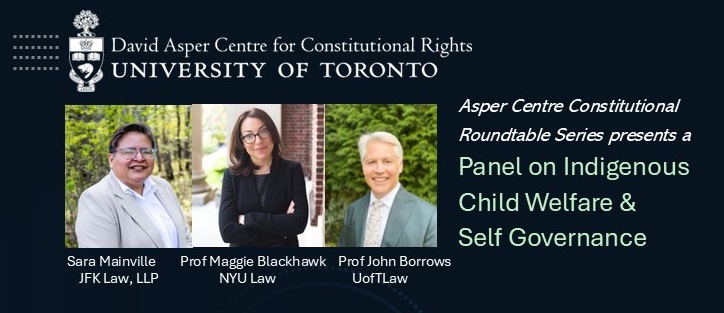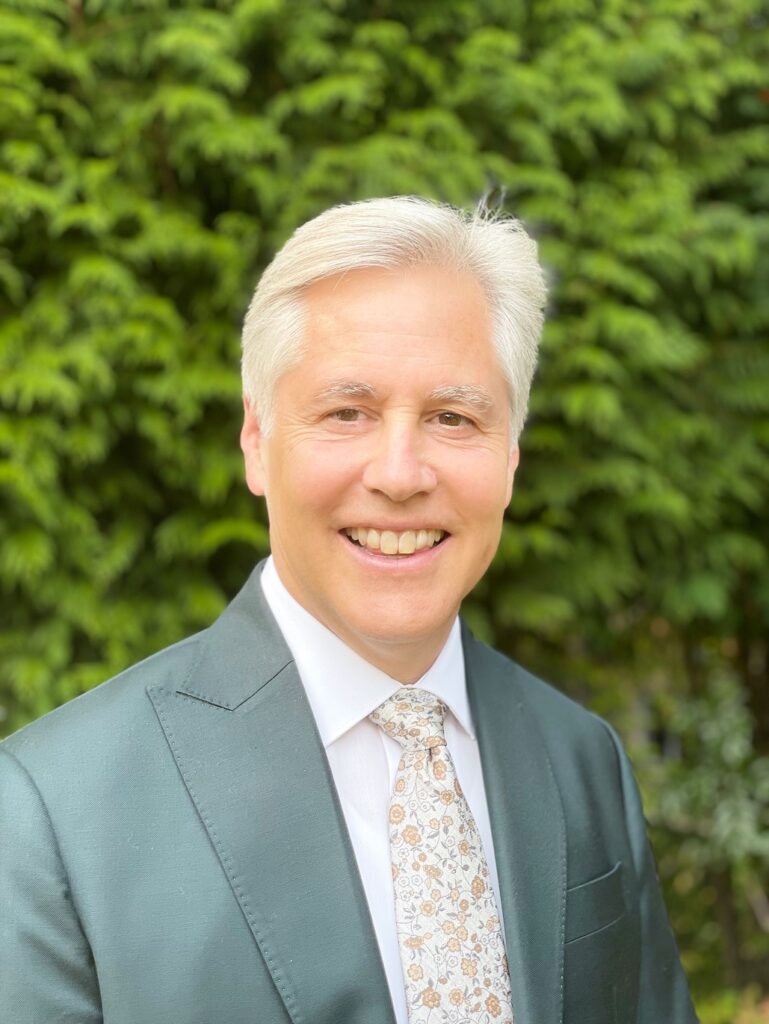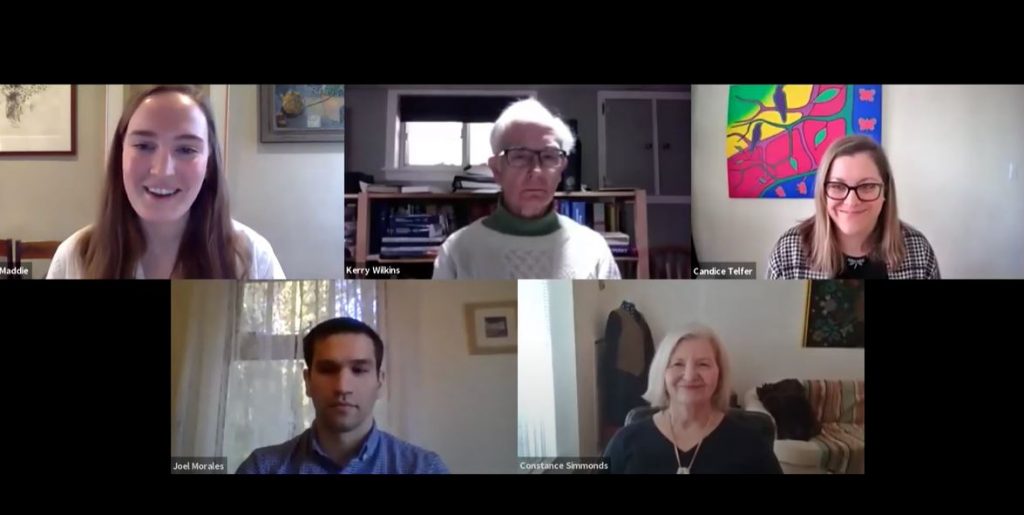
Asper Centre Constitutional Roundtable Presents a Panel on
Indigenous Child Welfare & Self-Governance
with Prof John Borrows (the Loveland Chair of Indigenous Law, UofT Law), Prof Maggie Blackhawk (NYU Law) & Sara Mainville (JFK Law LLP)
Moderated by Asper Centre ED, Cheryl Milne
Thursday, October 31, 2024 at 12:30pm – 2:00pm (in person or virtual)
Room J130, Jackman Law Building, Faculty of Law, University of Toronto
All are welcome * Light lunch will be provided * Registration Required
REGISTER HERE
Background
Over the past few years, both Canadian and American courts have decided cases that impact Indigenous Nations’ ability to care for Indigenous children. Both countries have histories and present realities of removing Indigenous children from Indigenous homes, thereby jeopardizing the safety of Indigenous children and undermining Indigenous Nations’ sovereignty and governance. With this context in mind, the recent Supreme Court of the United States Haaland v Brackeen decision, and the Supreme Court of Canada Attorney General of Québec, et al. v. Attorney General of Canada, et al decisions are of paramount importance to Indigenous sovereignty and safety. Both cases address federal legislation introduced to address the historic and ongoing harms caused by the apprehension of Indigenous children by settler governments. In both countries, these decisions also demonstrate how child welfare is closely connected to Indigenous assertions of and rights to self-government.
The Asper Centre Indigenous Rights Working Group is pleased to present a panel event to unpack the significant legal issues and potential future implications of these cases, with a focus on the Quebec Reference case and its meaning for the interpretation of Section 35 of the Constitution and Indigenous self-governance.
Panelists
 Maggie Blackhawk (Fond du Lac Band of Lake Superior Ojibwe) is professor of law at NYU and a prize-winning scholar and teacher of federal Indian law, constitutional law, and legislation. Blackhawk was awarded the American Society for Legal History’s William Nelson Cromwell Article Prize and her research has been published or is forthcoming in the Harvard Law Review, Stanford Law Review, Yale Law Journal, Supreme Court Review, American Historical Review, Legislative Studies Quarterly, Journal of the Early Republic, and Journal of Politics. Much of her scholarship explores the relationship between law and power, with a particular emphasis on the ways that subordinated peoples leverage law to shift power to their communities—especially outside of rights and courts-based frameworks. Her recent projects have focused on the laws and legal histories of American colonialism and the central role of the American colonial project, including the resistance and advocacy of Native and other colonized peoples, in shaping the constitutional law and history of the United States.
Maggie Blackhawk (Fond du Lac Band of Lake Superior Ojibwe) is professor of law at NYU and a prize-winning scholar and teacher of federal Indian law, constitutional law, and legislation. Blackhawk was awarded the American Society for Legal History’s William Nelson Cromwell Article Prize and her research has been published or is forthcoming in the Harvard Law Review, Stanford Law Review, Yale Law Journal, Supreme Court Review, American Historical Review, Legislative Studies Quarterly, Journal of the Early Republic, and Journal of Politics. Much of her scholarship explores the relationship between law and power, with a particular emphasis on the ways that subordinated peoples leverage law to shift power to their communities—especially outside of rights and courts-based frameworks. Her recent projects have focused on the laws and legal histories of American colonialism and the central role of the American colonial project, including the resistance and advocacy of Native and other colonized peoples, in shaping the constitutional law and history of the United States.
 Sara Mainville is a partner at JFK Law LLP and has been a member of the Ontario bar since 2005 and she is a member of the BC bar (2022) with specific matter approvals to practice in Nunavut and Quebec. Sara has a Management/Public Administration degree (Lethbridge) and a Bachelor of Laws from Queen’s University. She has a LLM from the University of Toronto and an Advanced Negotiations certificate from Harvard University, and a Certificate in Entertainment Law (Osgoode PD). In 2014, Sara was elected as Chief of Couchiching First Nation after the sudden death of her friend and mentor, Chief Chuck McPherson. Sara uses this experience as a former Chief to help leadership work past difficult issues, within Indigenous forms of dispute resolution, and walk the community through processes to encourage discourse and grassroots solutions to long-held problems. Sara has completed Advanced Negotiations training at Harvard University and dispute resolution, legislative drafting, and mediation training at professional institutes in order to advance her clients’ long held goals for self-determination and truer treaty partnerships in Canada. Sara is generally seen as a subject-matter expert about Crown-Indigenous relations, the United Nations Declaration on the Rights of Indigenous Peoples, Treaty 3, and Anishinaabe Inakonigewin. However, Sara sees herself as a life-long learner willing to meet in community, read voraciously, and listen intently to better understand Indigenous knowledge systems across Canada.
Sara Mainville is a partner at JFK Law LLP and has been a member of the Ontario bar since 2005 and she is a member of the BC bar (2022) with specific matter approvals to practice in Nunavut and Quebec. Sara has a Management/Public Administration degree (Lethbridge) and a Bachelor of Laws from Queen’s University. She has a LLM from the University of Toronto and an Advanced Negotiations certificate from Harvard University, and a Certificate in Entertainment Law (Osgoode PD). In 2014, Sara was elected as Chief of Couchiching First Nation after the sudden death of her friend and mentor, Chief Chuck McPherson. Sara uses this experience as a former Chief to help leadership work past difficult issues, within Indigenous forms of dispute resolution, and walk the community through processes to encourage discourse and grassroots solutions to long-held problems. Sara has completed Advanced Negotiations training at Harvard University and dispute resolution, legislative drafting, and mediation training at professional institutes in order to advance her clients’ long held goals for self-determination and truer treaty partnerships in Canada. Sara is generally seen as a subject-matter expert about Crown-Indigenous relations, the United Nations Declaration on the Rights of Indigenous Peoples, Treaty 3, and Anishinaabe Inakonigewin. However, Sara sees herself as a life-long learner willing to meet in community, read voraciously, and listen intently to better understand Indigenous knowledge systems across Canada.
 John Borrows B.A., M.A., J.D., LL.M. (Toronto), Ph.D. (Osgoode Hall Law School), LL.D. (Hons., Dalhousie, York, SFU, Queen’s & Law Society of Ontario), D.H.L, (Toronto), F.R.S.C., O.C., is the Loveland Chair in Indigenous Law at the University of Toronto Law School. His publications include, Recovering Canada; The Resurgence of Indigenous Law (Donald Smiley Award best book in Canadian Political Science, 2002), Canada’s Indigenous Constitution (Canadian Law and Society Best Book Award 2011), Drawing Out Law: A Spirit’s Guide (2010), Freedom and Indigenous Constitutionalism ((Donald Smiley Award best book in Canadian Political Science, 2016), The Right Relationship (with Michael Coyle, ed.), Resurgence and Reconciliation (with Michael Asch, Jim Tully, eds.), Law’s Indigenous Ethics (2020 Best subsequent Book Award from Native American and Indigenous Studies Association, 2020 W. Wes Pue Best book award from the Canadian Law and Society Association). He is the 2017 Killam Prize winner in Social Sciences and the 2019 Molson Prize Winner from the Canada Council for the Arts, the 2020 Governor General’s Innovation Award, and the 2021 Canadian Bar Association President’s Award winner. He was appointed as an Officer of the Order of Canada in 2020. John is a member of the Chippewa of the Nawash First Nation in Ontario, Canada.
John Borrows B.A., M.A., J.D., LL.M. (Toronto), Ph.D. (Osgoode Hall Law School), LL.D. (Hons., Dalhousie, York, SFU, Queen’s & Law Society of Ontario), D.H.L, (Toronto), F.R.S.C., O.C., is the Loveland Chair in Indigenous Law at the University of Toronto Law School. His publications include, Recovering Canada; The Resurgence of Indigenous Law (Donald Smiley Award best book in Canadian Political Science, 2002), Canada’s Indigenous Constitution (Canadian Law and Society Best Book Award 2011), Drawing Out Law: A Spirit’s Guide (2010), Freedom and Indigenous Constitutionalism ((Donald Smiley Award best book in Canadian Political Science, 2016), The Right Relationship (with Michael Coyle, ed.), Resurgence and Reconciliation (with Michael Asch, Jim Tully, eds.), Law’s Indigenous Ethics (2020 Best subsequent Book Award from Native American and Indigenous Studies Association, 2020 W. Wes Pue Best book award from the Canadian Law and Society Association). He is the 2017 Killam Prize winner in Social Sciences and the 2019 Molson Prize Winner from the Canada Council for the Arts, the 2020 Governor General’s Innovation Award, and the 2021 Canadian Bar Association President’s Award winner. He was appointed as an Officer of the Order of Canada in 2020. John is a member of the Chippewa of the Nawash First Nation in Ontario, Canada.

